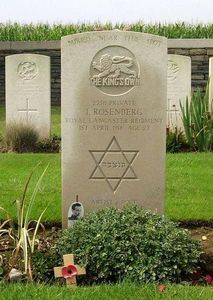POEMS
Isaac Rosenberg
Bookseller: Sumner & Stillman [ABAA]
(Yarmouth, ME, U.S.A.)
Bookseller Rating: 5-star rating
Price: US$ 1275.00
[Convert Currency]
Quantity Available:: 1 Within U.S.A.:
US$ 7.50
[Rates & Speeds] Add Book to Shopping Basket
Book Description: 1922, 1922. Rosenberg, Isaac. POEMS. Selected by Gordon Bottomley. With an Introductory Memoir by Laurence Binyon. London: William Heinemann, 1922. Original black cloth with spine label, with dust jacket. First Edition, which consisted of only 500 copies. The volume contains Rosenberg's 1916 play "Moses," as well as some early verse (some of which had appeared in a couple of now-rare wrappered booklets in 1912 and 1915) -- but this volume's fame comes from the twenty verses here first published, as the group "Poems from Camp and Trench." One of the twenty is "Break of Day in the Trenches," which has often been cited as the single greatest World War I poem; others include "Killed in Action," "Louse Hunting," "The Dying Soldier" and "Dead Man's Dump." Rosenberg was also an accomplished painter; Binyon and Bottomley, the editors, wanted to include in this book some plates of Rosenberg's art, but Heinemann the publisher refused. Rosenberg, small and suffering from lung disease, grew up in a Jewish section of London -- emigrating to South Africa (where his sister lived) for the sake of drier air. When the war began in 1914, he wrote a poem in Cape Town "On Receiving the First News of the War" that ends with O ancient crimson curse! Corrode, consume; Give back this universe Its pristine bloom. Rosenberg headed back to England to enlist, and wound up first in a "bantam battalion" for under-sized soldiers and ultimately in the King's Own Royal Lancaster Regiment. He survived three years in the trenches, but on 1 April 1918, just seven months before the Armistice, at the conclusion of night patrol on the Somme, he was shot and killed at dawn. He is one of sixteen Great War poets commemorated in Poets' Corner of Westminster Abbey. This is a handsome copy: the volume is fine except for an apparently-natural wrinkle in the front cover cloth, in the scarce dust jacket which has scarcely any wear and with less darkening of the spine than is typical. MILITARY / WAR (CODE:11118), London: William Heinemann, 1922. Bookseller Inventory # 11118
| Edition |
inscribed by sister |
| Nationality |
British |
| Pub Place |
London |
| Dust Jacket |
dj |
| First Edition |
Yes |
|
|
|
|
Reilly 279.
rosenbergs sisters note
Isaac Rosenberg (25 November 1890 – 1 April 1918) was an English poet of the First World War who was considered to be one of the greatest of all English war poets. His "Poems from the Trenches" are recognised as some of the most outstanding written during the First World War.
Isaac Rosenberg was born in Bristol in 1890 to Barnet and Annie Rosenberg, who had fled Devinsk in Lithuania to escape anti-Jewish pogroms. In 1897 the family moved to 47 Cable Street in a poor district of the East End of London, and one with a strong Jewish community. He attended St. Paul's School around the corner in Wellclose Square, until his family (of Russian descent) moved to Stepney in 1900, so he could experience Jewish schooling. He left school at the age of fourteen and became an apprentice engraver.
He was interested in both poetry and visual art, and managed to find the finances to attend the Slade School. During his time at Slade School, Rosenberg notably studied alongside David Bomberg, Mark Gertler, Stanley Spencer, Paul Nash, Edward Wadsworth and Dora Carrington. He was taken up by Laurence Binyon and Edward Marsh, and began to write poetry seriously, but he suffered from ill-health.
Suffering from chronic bronchitis, which he was afraid would only worsen, Rosenberg hoped to try and cure himself by emigrating to the warmer climate of South Africa, where his sister Mina lived.
He wrote the poem On Receiving News of the War in Cape Town, South Africa. While others wrote about war as patriotic sacrifice, Rosenberg was critical of the war from its onset. However, in order to find a "job" and be able to help support his mother, Rosenberg returned to England in October 1915 and enlisted in the army. He was assigned to the 12th Suffolk Folk Regiment, a 'bantam' battalion (men under 5'3"). After turning down an offer to become a lance corporal, Private Rosenberg was later transferred to the 11th Battalion, The King's Own Royal Lancaster Regiment (KORL). He was sent to the Somme on the Western Front in France where, having just finished night patrol, he was killed at dawn on April 1, 1918; there is a dispute as to whether his death occurred at the hands of a sniper or in close combat. In either case, Fampoux is the name of the town where he died. He was first buried in a mass grave, but in 1926, his remains were identified and reinterred, not in England, but at Bailleul Road East Cemetery, Plot V, St. Laurent-Blangy, Pas de Calais, France.
--Wikipedia
